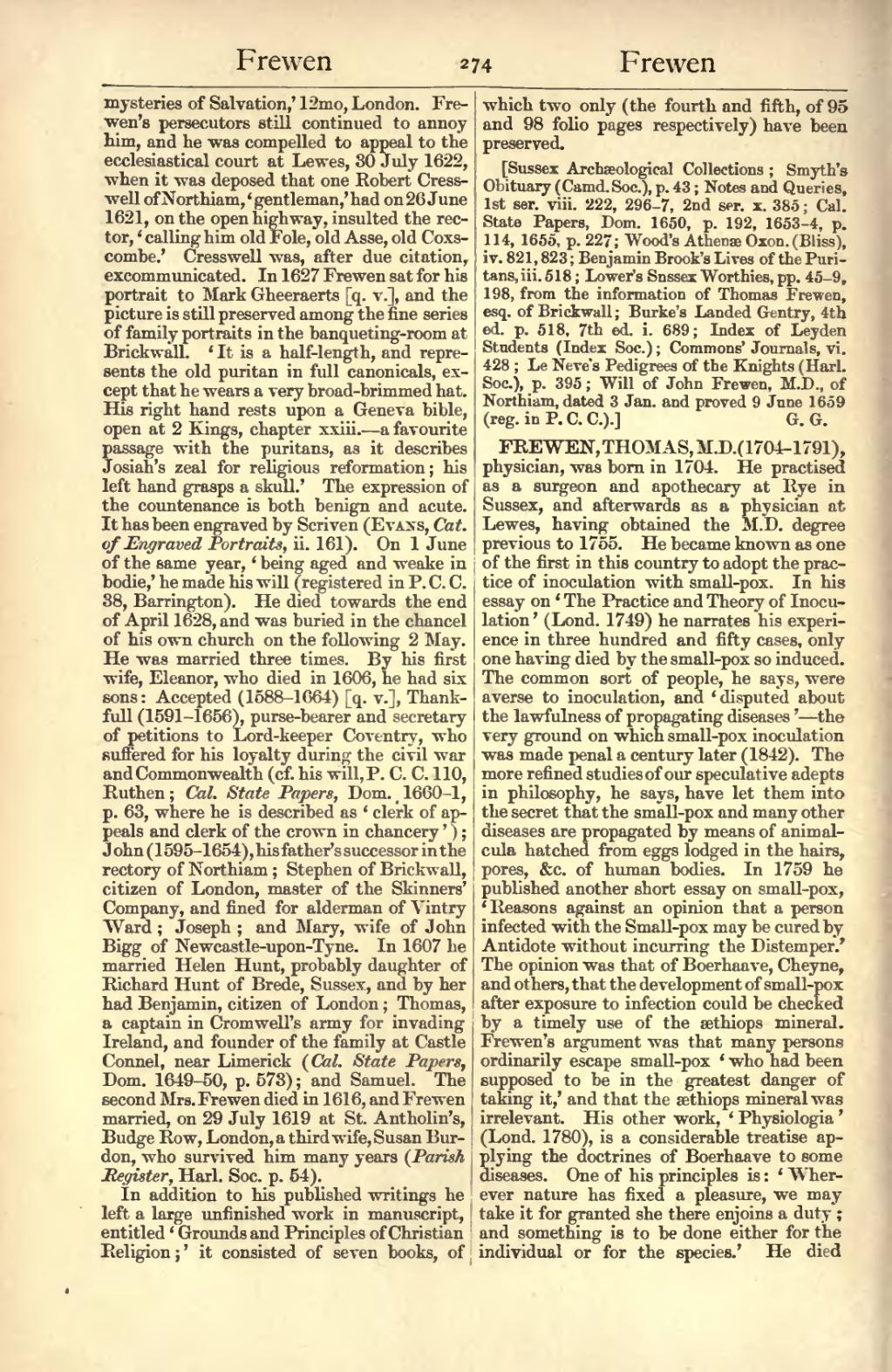mysteries of Salvation,’ 12mo, London. Frewen's persecutors still continued to annoy him, and he was compelled to appeal to the ecclesiastical court at Lewes, 30 July 1622, when it was deposed that one Robert Cresswell of Northiam, ‘gentleman,’ had on 26 June 1621, on the open highway, insulted the rector, ‘calling him old Fole, old Asse, old Coxscombe.’ Cresswell was, after due citation, excommunicated. In 1627 Frewen sat for his portrait to Mark Gheeraerts [q. v.], and the picture is still preserved among the fine series of family portraits in the banqueting-room at Brickwall. ‘It is a half-length, and represents the old puritan in full canonicals, except that he wears a very broad-brimmed hat. His right hand rests upon a Geneva bible, open at 2 Kings, chapter xxiii.—a favourite passage with the puritans, as it describes Josiah's zeal for religious reformation; his left hand grasps a skull.’ The expression of the countenance is both benign and acute. It has been engraved by Scriven (Evans, Cat. of Engraved Portraits, ii. 161). On 1 June of the same year, ‘being aged and weake in bodie,’ he made his will (registered in P. C. C. 38, Barrington). He died towards the end of April 1628, and was buried in the chancel of his own church on the following 2 May. He was married three times. By his first wife, Eleanor, who died in 1606, he had six sons: Accepted (1588–1664) [q. v.], Thankfull (1591–1656), purse-bearer and secretary of petitions to Lord-keeper Coventry, who suffered for his loyalty during the civil war and Commonwealth (cf. his will, P. C. C. 110, Ruthen; Cal. State Papers, Dom. 1660–1, p. 63, where he is described as ‘clerk of appeals and clerk of the crown in chancery’); John (1595–1654), his father's successor in the rectory of Northiam; Stephen of Brickwall, citizen of London, master of the Skinners' Company, and fined for alderman of Vintry Ward; Joseph; and Mary, wife of John Bigg of Newcastle-upon-Tyne. In 1607 he married Helen Hunt, probably daughter of Richard Hunt of Brede, Sussex, and by her had Benjamin, citizen of London; Thomas, a captain in Cromwell's army for invading Ireland, and founder of the family at Castle Connel, near Limerick (Cal. State Papers, Dom. 1649–50, p. 573); and Samuel. The second Mrs. Frewen died in 1616, and Frewen married, on 29 July 1619 at St. Antholin's, Budge Row, London, a third wife, Susan Burdon, who survived him many years (Parish Register, Harl. Soc. p. 54).
In addition to his published writings he left a large unfinished work in manuscript, entitled ‘Grounds and Principles of Christian Religion;’ it consisted of seven books, of which two only (the fourth and fifth, of 95 and 98 folio pages respectively) have been preserved.
[Sussex Archæological Collections; Smyth's Obituary (Camd. Soc.), p. 43; Notes and Queries, 1st ser. viii. 222, 296–7, 2nd ser. x. 385; Cal. State Papers, Dom. 1650, p. 192, 1653–4, p. 114, 1655, p. 227; Wood's Athenæ Oxon. (Bliss), iv. 821, 823; Benjamin Brook's Lives of the Puritans, iii. 518; Lower's Sussex Worthies, pp. 45–9, 198, from the information of Thomas Frewen, esq. of Brickwall; Burke's Landed Gentry, 4th ed. p. 518, 7th ed. i. 689; Index of Leyden Students (Index Soc.); Commons' Journals, vi. 428; Le Neve's Pedigrees of the Knights (Harl. Soc.), p. 395; Will of John Frewen, M.D., of Northiam, dated 3 Jan. and proved 9 June 1659 (reg. in P. C. C.).]
FREWEN, THOMAS, M.D. (1704–1791), physician, was born in 1704. He practised as a surgeon and apothecary at Rye in Sussex, and afterwards as a physician at Lewes, having obtained the M.D. degree previous to 1755. He became known as one of the first in this country to adopt the practice of inoculation with small-pox. In his essay on ‘The Practice and Theory of Inoculation’ (Lond. 1749) he narrates his experience in three hundred and fifty cases, only one having died by the small-pox so induced. The common sort of people, he says, were averse to inoculation, and ‘disputed about the lawfulness of propagating diseases’—the very ground on which small-pox inoculation was made penal a century later (1842). The more refined studies of our speculative adepts in philosophy, he says, have let them into the secret that the small-pox and many other diseases are propagated by means of animalcula hatched from eggs lodged in the hairs, pores, &c. of human bodies. In 1759 he published another short essay on small-pox, ‘Reasons against an opinion that a person infected with the Small-pox may be cured by Antidote without incurring the Distemper.’ The opinion was that of Boerhaave, Cheyne, and others, that the development of small-pox after exposure to infection could be checked by a timely use of the æthiops mineral. Frewen's argument was that many persons ordinarily escape small-pox ‘who had been supposed to be in the greatest danger of taking it,’ and that the æthiops mineral was irrelevant. His other work, ‘Physiologia’ (Lond. 1780), is a considerable treatise applying the doctrines of Boerhaave to some diseases. One of his principles is: ‘Wherever nature has fixed a pleasure, we may take it for granted she there enjoins a duty; and something is to be done either for the individual or for the species.’ He died
